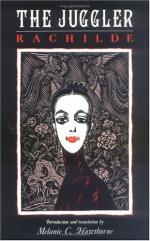|
This section contains 4,227 words (approx. 15 pages at 300 words per page) |

|
SOURCE: "Rachilde: Fin de siècle Perspective on Perversities," in Modernity and Revolution in Late Nineteenth-Century France, edited by Barbara T. Cooper and Mary Donaldson-Evans, University of Delaware Press, 1992, pp. 52-64.
In the following essay, McLendon perceives what is usually considered perverted behavior in Rachilde's fictional works as an indirect means used by the author to protest oppressive social conventions and institutions of her time.
So far from constituting a threat to "good" moral values of the belle époque, the offbeat French novel of the 1880s and 1890s, often subtitled "Parisian Manners" or even "Foreign Manners" and regularly kept under surveillance by the civil and literary police concerned about its depravity, actually promulgated a message and an ethic founded to a great extent on those very values it appeared to bring under attack. Bourgeois life during the Third Republic had done a rather good job of hiding its...
|
This section contains 4,227 words (approx. 15 pages at 300 words per page) |

|


